Understanding the purpose and role of the CAA UAE in higher education
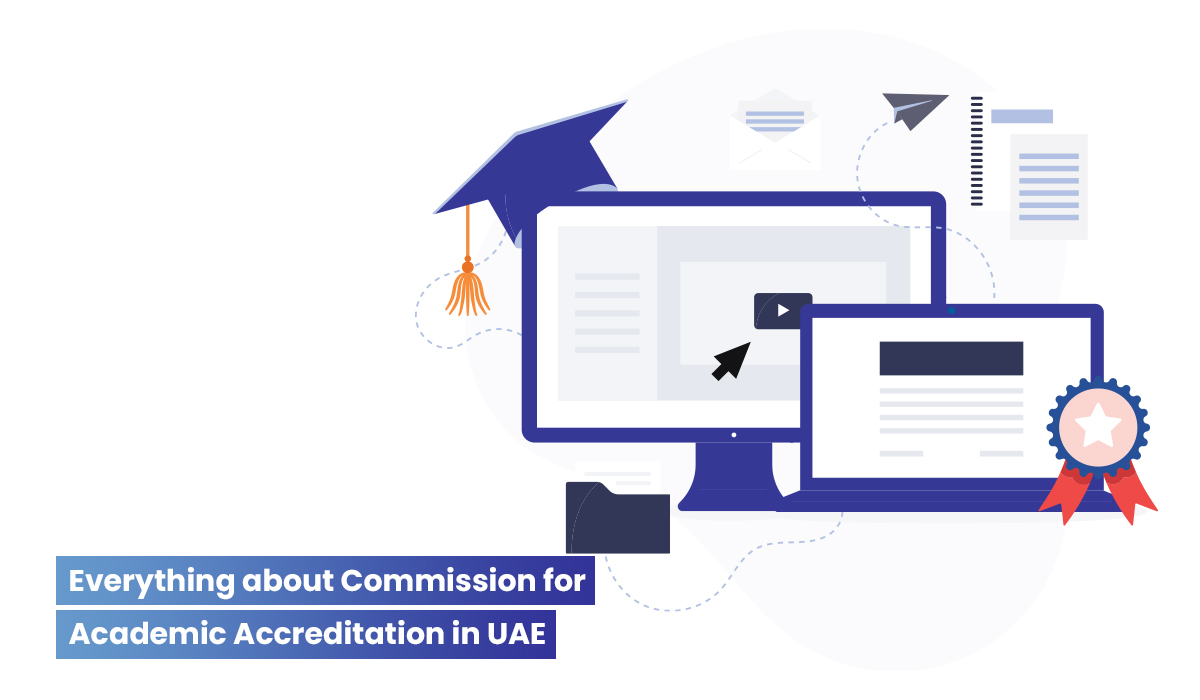
To colleges and universities that struggle to prove their learning and teaching caliber in the UAE region and to attract more students, the CAA or Commission for Academic Accreditation comes as bliss. This accreditation body evaluates and accredits colleges, universities, and academic programs to ensure they meet certain standards of quality and academic rigor. There are various criteria and parameters that the CAA takes into account to assess institutions. Let’s learn everything in detail about CAA in the UAE Ministry of education.
What is the commission for academic accreditation (CAA)?
CAA is UAE’s official higher education quality assurance organization. It accredits all higher education institutions not affiliated with the federal government by taking them through a series of quality assurance steps and offering them a license to operate.
Despite the fact that the CAA was reserved for institutions outside the free zones of the UAE, many institutions that operate in free zones are now applying for licenses and accreditation with the CAA. Even the Degree programs offered by federal (government-run) institutions are now also accredited.
The CAA and its team play a significant leadership role in ensuring and improving the caliber of higher education in the UAE by collaborating with pertinent local and international authorities.
It evaluates a range of factors, including the institution's governance and administration, academic programs, faculty, and student services, to determine whether the institution should receive accreditation.
The history of CAA in UAE
The Commission for Academic Accreditation (CAA) was established in the United Arab Emirates (UAE) in 2006 with the aim of ensuring the quality of higher education and improving the academic standards of higher education institutions in the country. The CAA is responsible for accrediting both public and private higher education institutions in the UAE, and it operates under the authority of the Ministry of Education.
The CAA was established in response to the rapid growth of higher education in the UAE and the need for a regulatory body to ensure that students receive a high-quality educational experience. The CAA sets and maintains standards for academic programs and institutional quality, and it provides guidance and support to higher education institutions to help them meet these standards.
Since its establishment, the CAA has been instrumental in promoting the development of higher education in the UAE and ensuring that students receive a high-quality education. The CAA has also played a key role in promoting the UAE as a hub for education and research, attracting students and scholars from around the world.
In recent years, the CAA has introduced new initiatives and programs to support the growth of higher education in the UAE, including the development of e-learning platforms and the use of technology to streamline the accreditation process.
The CAA is committed to continuing its efforts to ensure that higher education institutions in the UAE deliver a world-class educational experience to students and prepare them for success in their future careers.
The role and responsibilities of CAA
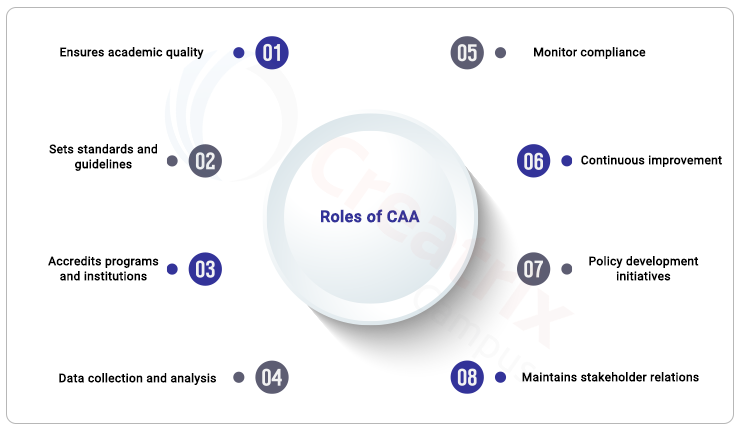
The Commission for Academic Accreditation (CAA) in higher education advances students' learning opportunities, especially in Diploma, Higher Diploma, and Bachelor's degrees.
It has several key roles and responsibilities and the major ones are discussed below:
Ensuring academic quality:
In order to evaluate academic programs offered by universities and colleges to ensure they meet standards of academic quality, CAA monitors institutions through regular reviews and assessments. It evaluates factors such as curriculum, faculty qualifications, educational resources, and student outcomes.
Setting standards and guidelines:
The CAA develops and implements evaluation criteria, policies, and procedures to assess the academic quality of HEIs, including faculty qualifications, curriculum, infrastructure, and student outcomes.
Accrediting programs and institutions:
The CAA accredits institutions and programs through steps like self-evaluation, site visits, evaluation report submissions, and final decision-making.
Data collection and analysis:
The CAA collects and analyzes data related to higher education institutions and programs to inform its accreditation decisions and to support continuous improvement.
Monitoring compliance:
The CAA uses a variety of methods to monitor compliance, including site visits, review of annual reports, interim review, and communication with institutions and stakeholders. If an institution fails to meet the CAA standards and guidelines, the CAA may impose sanctions, such as probation, or revoke its accreditation.
Continuous improvement:
The CAA works with higher education institutions to identify areas for improvement and to encourage the ongoing development and improvement of academic programs. It provides constant guidance and support to institutions to help them improve their programs and maintain high academic standards.
Policy development:
The CAA participates in the development of national policies and guidelines related to higher education and academic accreditation.
Stakeholder relations:
The CAA maintains relationships with stakeholders such as students, faculty, institutions, and employers to gather information and feedback about the quality of higher education.
Criteria and standards of the CAA UAE
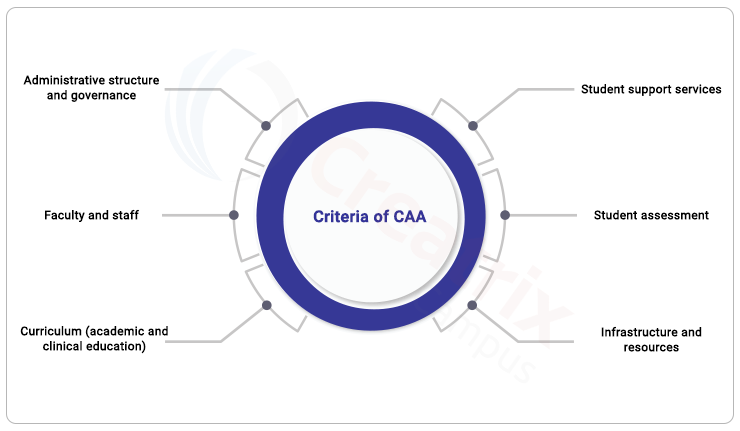
The criteria and standards of the Commission for Academic Accreditation (CAA) serve a number of purposes in the higher education sector. They
- serve as a benchmark for quality.
- promote clarity and transparency about what HEIs are expected to achieve and how their academic programs will be evaluated. This helps students, employers, and other stakeholders make informed decisions about the quality of HEIs and their programs.
- identify areas for improvement and provide recommendations for improvement.
- align with the government's policies and objectives.
Below is the list of CAA’s criteria and standards that cover various aspects of HEIs and their academic programs.
Administrative structure and governance: This includes criteria related to the institution's mission, vision, strategic plan, and organizational structure.
The CAA evaluates the effectiveness of the institution's leadership and management, as well as its policies and procedures for academic governance.
Faculty and staff: This includes criteria related to the qualifications, experience, and continuing professional development of faculty and staff. The CAA evaluates the institution's efforts to attract, retain, and support a highly qualified and engaged faculty, as well as its policies and procedures for evaluating and promoting faculty.
Curriculum (academic and clinical education): This includes criteria related to the design, development, and delivery of academic programs, as well as their alignment with the needs of students and the wider community. The CAA evaluates the quality of the institution's academic programs, including the rigor and relevance of its courses, the effectiveness of its teaching methods, and the support provided to students.
Student support services: This includes criteria related to student services, such as academic advising, career services, and student life programs. The CAA evaluates the institution's efforts to provide a supportive and engaging learning environment, including its efforts to foster a sense of community and belonging among students.
Student assessment: This includes criteria related to student achievement and satisfaction, as well as their career prospects after graduation. The CAA evaluates the institution's efforts to help students achieve their academic and professional goals, including its efforts to prepare students for careers and to support their successful transition to the workforce.
Infrastructure and resources: This includes criteria related to the institution's commitment to research and scholarly activities, including its support for faculty research and its efforts to promote the dissemination of research results.
The CAA evaluates the institution's efforts to provide a safe, secure, and well-maintained learning environment, as well as its efforts to support the use of technology in teaching and learning.
The process of the commission for academic accreditation (CAA)
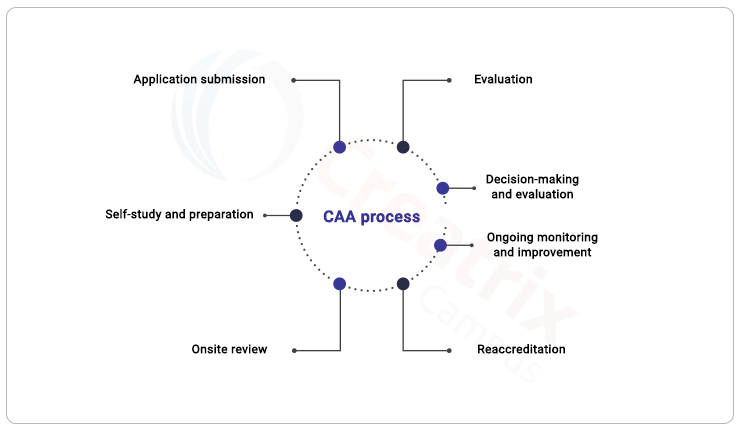
The Commission for Academic Accreditation (CAA) in the United Arab Emirates (UAE) follows a structured process to accredit higher education institutions (HEIs) and their academic programs.
The process typically involves the following steps:
Application submission:
The HEI submits an application for accreditation, along with supporting documents and evidence, to the CAA. The application should demonstrate the HEI's compliance with the CAA's criteria and standards.
Self-study and preparation:
This step is crucial to HEIs as they conduct a self-evaluation of their programs and facilities to identify strengths and weaknesses and to identify areas for improvement. Based on the results of the self-evaluation, HEIs develop an action plan to address any areas of weakness and improve the quality of their programs and facilities.
Onsite review:
The CAA reviews the HEI's application and supporting evidence to assess the quality of the institution and its academic programs. The review may also include a site visit, during which the CAA's accreditation team meets with the institution's administrators, faculty, staff, and students.
Evaluation:
Based on the review results, the CAA's accreditation team evaluates the HEI's compliance with the CAA's criteria and standards, and provides a written report of its findings.
Decision-making and evaluation:
The CAA makes a decision on accreditation, based on the evaluation results. The decision may be to grant accreditation, to grant accreditation with conditions, or to deny accreditation. The HEI will receive a written report outlining the CAA's decision and any recommendations for improvement.
Ongoing monitoring and improvement:
The CAA monitors the HEI's compliance with the conditions of accreditation, and may conduct follow-up site visits to ensure that the institution is making progress in meeting the CAA's standards. The CAA also reviews the institution's accreditation status on a regular basis to ensure that it continues to meet the CAA's criteria and standards.
Reaccreditation:
The HEI must reapply for accreditation at the end of the accreditation period, which is typically five years. The reaccreditation process is similar to the initial accreditation process, with the HEI submitting an application and supporting evidence, and the CAA conducting a review and evaluation.
Benefits of CAA to UAE higher education institutions
The Commission for Academic Accreditation (CAA) in the United Arab Emirates (UAE) provides several benefits to higher education institutions, including:
Quality assurance: The CAA ensures that higher education institutions in the UAE meet standards of quality in terms of their academic programs, facilities, and governance.
Enhanced reputation and credibility: Accreditation by the CAA enhances the reputation of higher education institutions, making them more attractive to students, employers, and international academic partners.
Access to funding: Accreditation by the CAA may make higher education institutions eligible for government funding and grants.
Improved standards: The CAA helps higher education institutions to improve the quality of their academic programs, teaching, and research, and to enhance the overall learning experience for students.
Enhanced competitiveness: Accreditation by the CAA makes higher education institutions more competitive in the regional and international education markets.
Challenges and considerations in the CAA Process
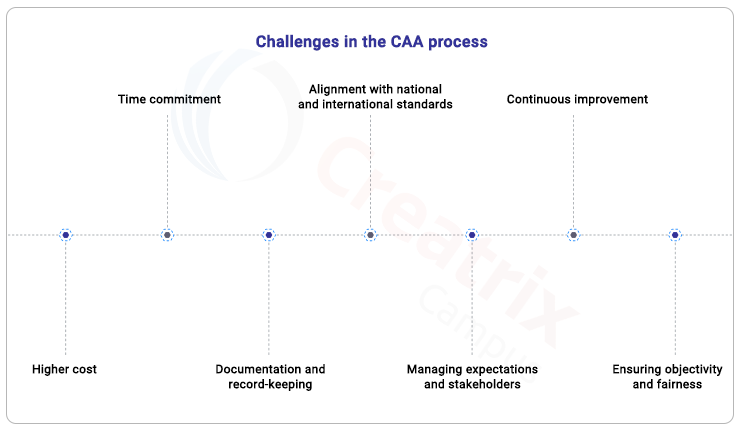
The Commission for Academic Accreditation (CAA) process can present several challenges for higher education institutions in the United Arab Emirates (UAE) some of which are listed below;
Cost: The accreditation process can be expensive for higher education institutions, as they need to pay for self-study reports, site visits, and other associated costs.
Time commitment: The accreditation process can be time-consuming, requiring significant effort and resources from higher education institutions.
Documentation and record-keeping: Higher education institutions need to keep detailed records and documentation to demonstrate compliance with the CAA's standards and requirements.
Alignment with national and international standards: Higher education institutions need to ensure that their programs, policies, and procedures align with both national and international standards and best practices in higher education.
Managing expectations and stakeholders: The CAA process is rigorous and requires significant effort, resources, and time. This can lead to resistance and frustration among stakeholders, particularly if the expectations are not properly managed. Therefore HEIs have to maintain transparency and open communication throughout the accreditation process to ensure that all stakeholders are well-informed and that their concerns are addressed.
Continuous improvement: Higher education institutions need to maintain the quality of their programs and facilities to ensure continued accreditation.
Ensuring objectivity and fairness: The CAA must ensure that the accreditation process is transparent, objective, and fair and that the criteria and standards used are applied consistently across all institutions.
How can accreditation process automation help in CAA?
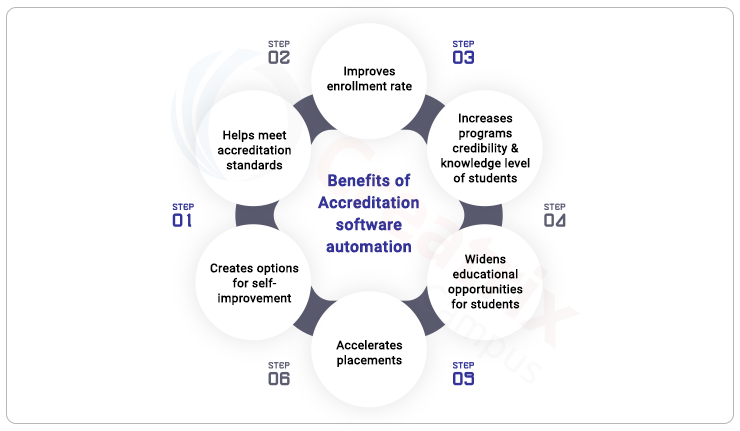
The manual Commission of Academic Accreditation (CAA) process can get tough for several reasons including time consumption, lack of standardization, human error, etc. Accreditation software can help ease out the cumbersome process by,
Streamlines documentation:
Automated systems can help higher education institutions to manage and organize large amounts of documentation and information required for accreditation, making the process more efficient and reducing the risk of errors.
Enhances data collection and analysis:
Automated systems can help to collect and analyze data more effectively, making it easier to demonstrate compliance with the CAA's standards and requirements.
Improves communication:
Automated systems can improve communication between higher education institutions and the CAA, reducing the risk of miscommunication and ensuring that all stakeholders are kept informed.
Facilitates continuous improvement:
Automated systems can help higher education institutions to track their progress toward accreditation, identify areas for improvement, and implement changes in a more efficient and effective manner.
Improves security:
Automated systems can help to secure confidential information and sensitive data, protecting it from unauthorized access and ensuring that it is only accessible to those who need it.
Reducing manual workload:
Automated systems can reduce the workload of administrative staff and faculty, freeing up time and resources that can be used for other important tasks.
How Creatrix Campus accreditation software can help automate the Commission for Academic Accreditation (CAA) process?
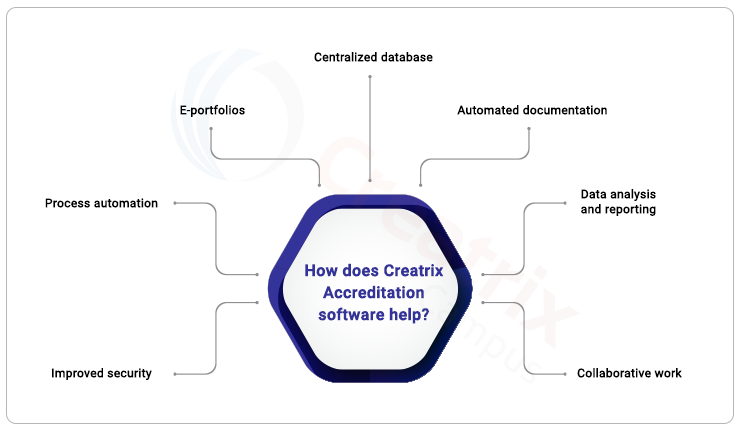
Creatrix Campus accreditation software can help automate the Commission for Academic Accreditation (CAA) process in several ways, including:
Centralized database: Creatrix Campus provides a centralized database that allows higher education institutions to manage and organize all the data and information required for accreditation in one place.
Automated documentation: Creatrix Campus can automate the generation of required documents, such as self-study reports and site visit reports, reducing the risk of errors and saving time.
Data analysis and reporting: Creatrix Campus provides real-time data analysis and reporting capabilities, allowing higher education institutions to monitor their progress toward accreditation and identify areas for improvement.
Collaborative work: Creatrix Campus enables higher education institutions to collaborate with the CAA and other stakeholders in real time, ensuring that everyone is kept informed and that the accreditation process runs smoothly.
E-portfolios: Creatrix Campus provides e-portfolios for students, faculty, and staff, allowing them to store and manage their academic and professional achievements in one place.
Process automation: Creatrix Campus can automate many aspects of the accreditation process, from data collection and analysis to documentation and reporting, reducing the manual workload and freeing up time for other important tasks.
Improved security: Creatrix Campus provides secure and encrypted storage of data, ensuring that confidential information and sensitive data are protected from unauthorized access.
Creatrix Campus can automate the accreditation process with the Commission for Academic Accreditation in UAE by streamlining and simplifying many of the manual tasks involved. For example, our product can automate the tracking and reporting of accreditation-related activities, ensuring that all deadlines are met and all relevant information is easily accessible in one centralized location.
Additionally, our product can provide real-time updates on the status of the accreditation process, enabling organizations to make informed decisions and respond quickly to any changes or requirements. By automating the accreditation process, organizations can save time, reduce the risk of errors, and focus on the core activities that drive their success.
Final thoughts on the future of higher education accreditation in the UAE
The future of higher education accreditation in the United Arab Emirates (UAE) looks promising, with a focus on continuous improvement and the adoption of new technologies to enhance the process.
The Commission for Academic Accreditation (CAA) is committed to ensuring that higher education institutions in the UAE meet the highest standards of academic quality and deliver a high-quality educational experience to students. In the future, we can expect to see an increased use of software automation and other technologies to streamline the accreditation process and make it more efficient and effective.
This will help higher education institutions to focus on delivering high-quality education and ensuring that students receive the best possible learning experience.
Moreover, there will be an increased emphasis on stakeholder engagement and communication, to ensure that the needs and expectations of students, faculty, staff, employers, and government are considered and addressed throughout the accreditation process.
In conclusion, the future of higher education accreditation in the UAE is bright, with a focus on quality, innovation, and continuous improvement. The CAA and higher education institutions in the UAE are committed to delivering a world-class educational experience to students and preparing them for success in their future careers. HEIs must go through the Commission of Academic Accreditation (CAA) process for quality assurance and demonstrate their commitment to providing high-quality academic programs that meet established standards.
Contact our accreditation experts if you face hiccups in executing your CAA process.



